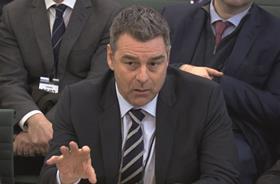Scathing 100-page report into firm’s collapse lays blame on its board and slams role of accountants

A parliamentary report into Carillion’s collapse has laid the blame at the door of its board singling out its former chief executive and finance director for presiding over a “rotten corporate culture” with MPs telling a separate Insolvency Service investigation into the failure that it needs to “carefully” look at whether the contractor’s directors breached company law.
In a 100-page report published today, the business and work and pensions committees, which launched a joint inquiry days after the £5bn firm went bust in January, said Carillion’s fall was “a story of recklessness, hubris and greed [based on] a relentless dash for cash, driven by acquisitions, rising debt, expansion into new markets and exploitation of suppliers”.
But it saved particular ire for the collapsed firm’s board with the committees, headed by Labour MPs Rachel Reeves and Frank Field, rounding on directors’ “self-pitying” evidence they heard in the weeks after its collapse.
It said: “They presented to us as self-pitying victims of a maelstrom of coincidental and unforeseeable mishaps.”
MPs singled out former chief executive Richard Howson, his finance director Richard Adam, who left at the end of 2016, and Carillion’s chairman at the time of its implosion, Philip Green, for particular criticism.
“They presented to us as self-pitying victims of a maelstrom of unforeseeable mishaps”
Parliamentary report
Howson, the MPs said, was a “figurehead for a business that careered out of control”, while Adam was labelled as the “architect of Carillion’s aggressive accounting policies [who] resolutely refused to make adequate contributions to the company’s pensions schemes”. And Green was derided as “an unquestioning optimist when his role was to challenge”.
The report added: “We recommend that the Insolvency Service, in its investigation into the conduct of former directors of Carillion, includes careful consideration of potential breaches of duties under the Companies Act.”
Others taken to task in the coruscating report included non-executive directors who “failed to […] challenge reckless executives” while Carillion’s 120 payment terms for suppliers was described as a “wheeze”.
MPs said Carillion’s auditor of 19 years, KPMG, was guilty of “complacently signing off the directors’ increasingly fantastical figures” adding: “In failing to exercise professional scepticism towards Carillion’s accounting judgments over the course of its tenure […] KPMG was complicit in them.”
Another Big Four accountant Deloitte was accused of being a “badge of credibility” after picking up £10m to act as Carillion’s internal auditor while EY, brought in after last July’s £845m writedown, “was paid £10.8m for six months of failed turnaround advice”.
Carillion’s final chief executive Keith Cochrane was described as having “quickly succumbed to the dysfunctionality prevalent on the board”. But his finance director at the time of the collapse was left unscathed with MPs describing Emma Mercer as demonstrating “a willingness to challenge the status quo”.
At the time it collapsed, Carillion employed 43,000 people globally including 20,000 in the UK. More than 2,300 jobs have since been lost.
It went bust owing £2bn to suppliers and racked up a £2.6bn pension liability.




























No comments yet